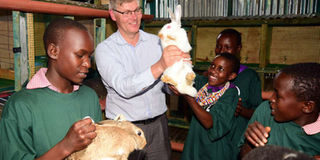YOUR ANIMAL DOCTOR

Pupils from Inkisanjani Primary School in Loitoktok display rabbits they keep. When keeping rabbits, whenever they develop habits of chewing wood, give them Intromin mineral block to alleviate their mineral deficiency. FILE PHOTO | LEOPOLD OBI | NMG
What you need to know:
- Pig rearing, like any other livestock venture is profitable as long as you get the right breed of animal, practice good management and can find market for your produce.
- Where possible, the pig house should be sited away from human dwellings, be properly ventilated and lit with good water supply and drainage.
- The bucks, kids and the does should be housed separately. The goats should be fed on napier grass mixed with desmodium, sweet potato vines and dairy meal (concentrate) to boost milk production.
- Provide Intromin mineral blocks regularly. Clean water should be provided for the goats all the time. Good management practices must be observed.
Why rabbits eat wood in their pens
My rabbits are eating the wood in their houses. What is the cause and how can I stop it?
Rabbits develop habits of chewing wood when they have a mineral deficiency. Give your rabbits Intromin mineral block which can be placed on the floor of their hatches or hanged where they can access to lick.
You can also keep them busy by hanging vegetables at the same level as their ears.
***
Basics of starting pig agribusiness
I have passion for pigs and would like to know more about them, like the starting capital and the best breeds to keep and value for money.
Anthony Peters
Pig rearing, like any other livestock venture is profitable as long as you get the right breed of animal, practice good management and can find market for your produce.
Pig farming is particularly enticing given the short gestation period (they furrow three times in 12 months) with a relatively large litter size (averages 10 piglets) and fast growth.
To break even, one must keep a large number of pigs. The popular breeds in Kenya are the Large white, Hampshire, Duroc and Landrace.
On average, you could purchase breeding animals at between Sh20,000 to Sh40,000 and sell a six-month-old 90kg pig at Sh18,000 or so.
Farmers Choice is the biggest buyer of ready pigs in Kenya.
Where possible, the pig house should be sited away from human dwellings, be properly ventilated and lit with good water supply and drainage.
The pigsty should be sheltered from rain and direct sun. For exact plans of the house, you can check online.
Feeds are the biggest cost contributing nearly 80 per cent of rearing cost. A source of quality pig feeds should be easily accessible to you.
Pig feeds include a Starter feed, Grower, Sow and weaner and pig finisher feeds. Pigs are fed twice a day and provided with clean wholesome water all times.
Pigs are vaccinated against, among others, Swine erysipelas, parvo, e.coli and clostridium.
***
Keeping Toggenburg goats
I would like to rear Toggenburg goats and I live in Nakuru North District. I heard that the goats are special and eat a lot to produce more milk. Please advise how I can successfully rear these goats.
Njeri
Successful rearing of dairy goats starts with proper housing. A good house should be raised one meter off the ground, should have proper ventilation and be well lit.
Each pen should measure 4 by 5 metres and hold up to four goats. Each should be divided into two sides, one for resting and the other for feeding.
The bucks, kids and the does should be housed separately. The goats should be fed on napier grass mixed with desmodium, sweet potato vines and dairy meal (concentrate) to boost milk production.
Provide Intromin mineral blocks regularly. Clean water should be provided for the goats all the time. Good management practices must be observed.
These include proper record-keeping, maintenance of good hygiene, hoof trimming, timely vaccinations against Contagious Caprine Pleuro Pneumonia and Enterotoxemia and deworm at least once every three months.
Observe milking hygiene.
***
Dealing with retained placenta
My cows keep having retained placentas, how can I stop this menace?
Kipkorir
Retained placenta is failure to expel foetal membranes within 24 hours after parturition.
Among other reasons, it is common in cases of mineral deficiencies, abortion, difficult calving, stillbirth, milk fever, aged cows, premature birth or when parturition is induced.
Supplement your cows with Vitamin E/Selenium and quality mineral licks during milking. Provide Intromin mineral blocks free choice.
You may invite a qualified vet to visit your farm and advice accordingly.




